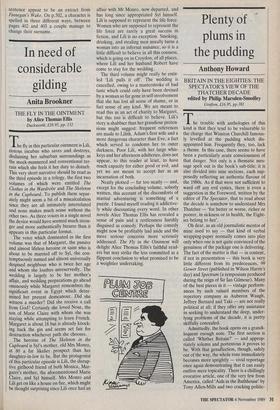In need of considerable gilding
Anita Brookner
THE FLY IN THE OINTMENT by Alice Thomas Ellis Duckworth, £10.95, pp. 132 Th. e fly in this particular ointment is Lili, riotous incubus who saves and destroys, disdaining her suburban surroundings as the meek-mannered and conventional ter- rain which she feels it her duty to disturb. This very short narrative should be read as the third episode in a trilogy, the first two volumes of which were entitled The Clothes in the Wardrobe and The Skeleton in the Cupboard. To publish them separ- ately might seem a bit of a miscalculation since they are all intimately interrelated and none makes much sense without the other two. As three voices in a single novel the device would have seemed much stron- ger and more authentically bizarre than it appears in this particular format. The voice which dominated in the first volume was that of Margaret, the passive and almost lifeless heroine or saint who is about to be married off to Syl, the con- temptuously named and almost universally despised neighbour who is twice her age and whom she loathes unreservedly. The wedding is largely to be her mother's affair, and wedding preparations go ahead ominously while Margaret remembers the , significant event in Egypt which deter- mined her present demeanour. Did she witness a murder? Did she receive a call from God? Certainly she loved Nour, the son of Marie Claire with whom she was staying while attempting to learn French. Margaret is about 18 but is already knock- ing back the gin and seems set fair for destruction whichever path she chooses.
The heroine of The Skeleton in the Cupboard is Syl's mother, old Mrs Monro, at 80 a far likelier prospect than her daughter-in-law to be. But the protagonist of this particular episode is Lili, the disrup- tive girlhood friend of both Monica, Mar- garet's mother, the aforementioned Marie Claire, and Syl himself. Mrs Monro and Lili get on like a house on fire, which might be thought surprising since Lili once had an affair with Mr Monro, now departed, and has long since appropriated Syl himself. Lili is supposed to represent the life force. Women who are supposed to represent the life force are rarely a great success in fiction, and Lili is no exception. Smoking, drinking, and stealing men usually turns a woman into an infernal nuisance, so it is a little difficult to believe in all this cosiness, which is going on in Croydon, of all places, where Lili and her husband Robert have come to stay for the wedding.
The third volume might really be entit- led 'Lai pulls it of. The wedding is cancelled, owing to a masterstroke of bad taste which could only have been devised by a woman so far gone in self-involvement that she has lost all sense of shame, or in fact sense of any kind. We are meant to read this as an act of charity to Margaret, but this too is difficult to believe. Lili's story is shabbier than her grandiose preten- sions might suggest: frequent references are made to Lilith, Adam's first wife and a more dangerous character than Eve, a fact which served to condemn her to outer darkness. Poor Lili, with her large whis- keys and her afternoon adulteries, does not appear, to this reader at least, to have much capacity for either good or evil, and yet we are meant to accept her as an incarnation of both.
Neatly plotted — far too neatly — and, except for the concluding volume, soberly written, this account of the discomforts of marital adventuring is something of a puzzle. I found myself reading it addictive- ly while discounting every word. In other novels Alice Thomas Ellis has revealed a sense of pain and a restlessness harshly disguised as comedy. Perhaps the comedy might now be profitably laid aside and the more serious concerns more seriously addressed. The Fly in the Ointment will delight Alice Thomas Ellis's faithful read- ers but may strike the less committed as a flippant conclusion to what promised to be a weightier undertaking.
















































 Previous page
Previous page